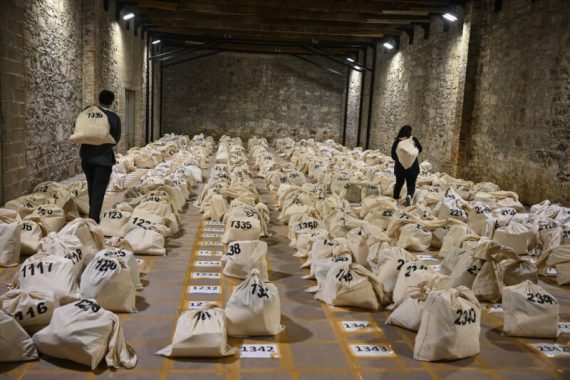T
he results of the May 14 elections in Turkey have surprised many voters, pro-government and pro-opposition alike. With all the ballot boxes opened for the presidency, current president Recep Tayyip Erdoğan leads with 49.52% of the votes, Kemal Kılıçdaroğlu follows with 44.88%, Sinan Oğan received 5.17%, and Muharrem İnce, who pulled out of the race two days ahead of the election, received 0.43% of the votes.
Partially, what caused this shock has been the inaccuracy of opinion polls. Prior to the elections, wide discrepancies between polling agencies were a topic of discussion. The majority of the polls predicted a significant decline in the support for Erdoğan with many of them anticipating a win for Kılıçdaroğlu. Moreover, it wasn’t only the results of the presidential race that went against expectations, polls also failed to predict the preferences of right-wing voters in the parliamentary elections. Where did polling agencies go wrong?
Polling agencies’ damage control
Predictions by notable agencies such as KONDA, Türkiye Raporu, MAK, and ORC strayed beyond the margin of error. KONDA’s latest poll from May 6-7 predicted the runoff election; however, it showed Kılıçdaroğlu in the lead with his votes falling just below 50%, whereas Türkiye Raporu’s poll on May 12 predicted Kılıçdaroğlu’s votes at 50.5%. This opened up speculations of reputability, bribery, and fabrication, which put agencies on damage control duty.
Türkiye Raporu director Can Selçuki posted an introspective tweet a day after the elections denying slanderous claims about receiving any kind of payment, and affirmed that the agency would review its methodologies to provide more accurate results.
ORC, which placed Kılıçdaroğlu at 51.7% and Erdoğan at 44.2%, shared a statement that aimed to restore its reputability, highlighting its accuracy in the elections that took place in 2018, and emphasized that it was the only agency that came close to predicting the Nationalist Movement Party’s (MHP) rate in the parliament.
Chairman of MAK Mehmet Ali Kulat shared a thorough public statement on May 17 about where the inaccuracies of his agency may have originated. The statement points to four types of errors that may have been made. First, there may be issues with the surveys’ interview technique conducted by call centers and causing +/- 2.9% margin of error.
Second, surveys were conducted in a hybrid format and there were issues detected in the overall reporting. Third, the surveys took place 12-18 days before the election date. The statement mentions that the presidential campaigns took a fast-paced turn in the last ten days leading to the election, resulting in an increase of factors influencing voters.
The fourth point expanded on the factor that may have affected the nationalist right-wing votes. It assessed Erdoğan’s emphasis on security policies, the defense industry, and other issues that ignite national sensitivities, alongside the accusation aimed at the opposition for failing to put a distance between itself and terror-associated actors as the main factors that kept votes within the People’s Alliance (with votes going to the MHP and YRP) rather than the opposition—even if voters were dissatisfied with Erdoğan. MAK had predicted Kılıçdaroğlu’s votes at 50.9% and Erdoğan’s at 45.4%.
MetroPoll agency shared two polls that it performed between 4-7 May a day after the election. The first poll, which predicted Erdoğan at 49.5%, and his main rival Kılıçdaroğlu at 44.7% when the undecided voters, protest votes and subjects who refused to answer were evenly distributed, was unpublished before the election. The second published version, which was performed after the incident in Erzurum where the Mayor of Istanbul Ekrem Imamoğlu was attacked with stones by a group, placed Kılıçdaroğlu’s votes at 49.1% and Erdoğan’s at 46.9%.
Hüseyin Çalışkaner, the general manager of Artıbir, claimed that the issue was not his agency’s polls, but that the votes had been stolen, putting forward a mismatch between reports from the ballots and the YSK’s data. Other agencies such as Yöneylem, which reported Kılıçdaroğlu at 49.5% and Erdoğan at 44.4%, stated that they would be making a further evaluation after the YSK releases the final election results when objections to votes are finalized.
Meanwhile, Optimar, Betimar, and Sonar were praised for reporting predictions that came closest to the election outcome. Their latest polls were as follows: Optimar predicted Erdoğan would win 50.4% of votes and Kılıçdaroğlu 44.7%; Betimar predicted Erdoğan at 49.1% and Kılıçdaroğlu at 45%; and Sonar forecasted Erdoğan would win 48.8% of votes and Kılıçdaroğlu 44.1%.
Recommended
Polls were unable to foresee nationalist right-wing votes
The parity amongst all opinion polls was the inability to predict the distribution of nationalist right-wing votes both for the presidential and parliamentary elections, as well as their above-average performance.
The Nationalist Movement Party (MHP), which was predicted to have a margin between 7% and 9%, overperformed by collecting 10.07% of the votes for the parliament. Similarly, Sinan Oğan’s achievement was beyond expectations at a rate of 5.17% when the polls placed his votes for the presidency at around 2-4%. Cihan Tuğal, a professor of sociology at Berkeley University, warns, “We need to be careful because this is not only an issue for Turkey. In Brazil, in Hungary, in the United States, everybody thinks that this mistake was made because of their own internal balances. In all four countries, the gains of right-wing parties are not reflected in the polls, they are reflected in the ballot box. In the polls, we see that a part of the far right’s electorate is embarrassed, they cannot stand behind what they have done, but they support the far right, which is a very general and common situation in these countries. The polls failed to see the New Welfare Party’s (YRP) big leap in votes, given its size, and the rise in the MHP.”
The New Welfare Party (YRP) will be represented by five deputies in the Grand National Assembly of Turkey, having garnered more than 1.5 million votes. So how did the YRP make this vote leap? Tuğal states, “It is said that the YRP received the votes of the working class.” He adds, “Although the polls didn’t show it, working class people, activists and researchers on the ground saw and said it, but there was no numerical support for it. When it comes to more closed structures like the MHP, it becomes impossible to see this.”
Additionally, researchers believe that seeking support from the HDP was counterintuitive. Hakan Bayrakçı, the head of SONAR, told the newspaper Aydınlık, “There are those who see the HDP as a key party. That is the case with Mr. Kılıçdaroğlu. But the problem here was that the HDP is not a key party in terms of votes. Yes, it has a vote of 8-9%, sometimes 10 points, but it also reduces votes from the side it is on. It alienates Kemalists and nationalists, and that is exactly what these elections proved.”
In the same interview, Hilmi Daşdemir, the head of Optimar, added, “We have stated before that those who make political calculations with the HDP and separatist movements will be in the wrong. It has once again become clear that the main force that will determine the government in Turkey is the nationalist trend. The results of President Erdoğan and the MHP are proof of this. The sum of secular nationalists and conservative nationalists is well above 50%. Even if their party preferences change, this group is sensitive to national sentiment. This center will determine the fate of Turkey in the second round and in the future. Secular nationalism will become stronger. Sinan Oğan seems to feed on this nationalist trend. The main reason for the opposition’s defeat is the appearance of cooperation with terrorist elements.”





